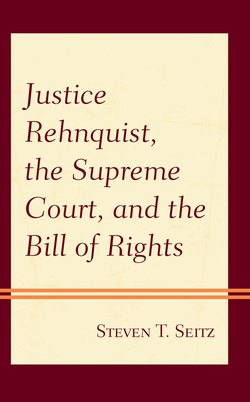Читать книгу Justice Rehnquist, the Supreme Court, and the Bill of Rights - Steven T. Seitz - Страница 37
На сайте Литреса книга снята с продажи.
State Abolition
ОглавлениеThe 14th Amendment would negate part of the Dred Scott decision, but neither the northern states nor the state courts were willing to wait. New York provided a sample case Lemmon v. the People 20 N.Y. 562 (N.Y. 1860) a month before the Civil War began. The facts of that case, and the logic used to decide, demonstrated the widening gap between the Taney Court and the state courts. Justice Denio reports that Ms. Lemmon took a steamer from the city of Norfolk, Virginia, to the city of New York. There she intended to change ships for a steamer bound to Texas. She had in her company eight personal slaves. She debarked with the slaves into New York while awaiting the steamer to Texas. During the layover, anti-slave activists entered the house, removing the said slaves. The Lemmons filed a writ of habeas corpus, asking production of her slaves before the court. The Lemmons indicated that slavery was legal in both Virginia and Texas, that she did not intend to stay in New York except to change ships in the port, and that she had come to New York only because there was a transit route to Texas.
An 1817 act of the state of New York unequivocally declared free any slave introduced or brought into the state under any pretense whatever. The legislature repealed any exceptions to this rule in 1841, even unavoidable instances. Slaves brought to New York would be set free. New York claimed the sovereign state right to determine the conditions of all persons at any time within its jurisdiction. New York had no voluntary abridgment of this rule contracted with any other state. No claim of comity within international law can bind this legislative decision. Conciliatory legislation is a matter of political power; it is the court that administers laws legally enacted by the state. The Fugitive Slave Law countenanced the opposite, but it was the moral expectation of many states at the forging of the Constitution that upon abolishing slavery in their state, the Fugitive Slave Law would no longer be obligatory. A state of slavery can exist only by positive law, and without it, the writ of habeas corpus may free them in cases other than fugitive slaves. The fugitive slave clause applies solely to the actual escape of a slave from one state to another. The privileges and immunities clause eliminated alienage of citizenship across the states.
A citizen asserting privileges and immunities must claim them according to the state in which the individual is bodily located, not the state from which the individual came. The laws of New York are clear; bring a slave into the state and the slave is free. Our courts have no obligation to apply the laws of another state. The owner of the slaves cannot do anything forbidden to our own citizens. Had the slaves remained on the ship while in the New York Harbor, the case may well have been federal, given Congress’ power over interstate commerce. They were, at debarkation, subject to the laws of New York. The temporary movement of a slave cargo from ship to land during an interstate voyage had never been the object of Congressional commerce legislation.
Justice Wright, with the concurrence of Justices Davies, Bacon, and Welles, repeated that slavery exists only by virtue of municipal law. It is repugnant to natural and civil law. The Constitution avoided referencing slaves as property, and the Fugitive Slave Law was a simple interstate compact limited only to a slave running away from the home state into another state. Habeas corpus removes a subject from private force into the public forum. Each state may regulate the social and civil condition of her citizens and of all persons within her territory. This power is exclusive; the only exception is the fugitive slave provision of the US Constitution. The laws of comity compel no state to violate its own laws.
Justice Clerke dissents. If the legislature of New York declared that all slaves brought within its borders, whatever the circumstances, are free, then does the state have the Constitutional authority to do so? Confiscating the property of citizens from other states passing through this one is inconsistent with the purpose of a perfect union with unrestricted intercourse. International law provides the passage through another’s territory with the person and the property intact. The right to the service and labor of another is property. Several clauses in the Constitution recognize slaves as property. Whatever the weakness of comity among nations, it is stronger among states of our Union. The rights thus established are within the cognizance of judicial tribunals.
